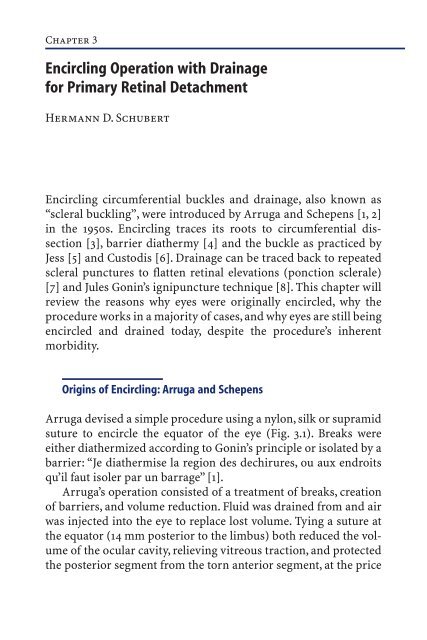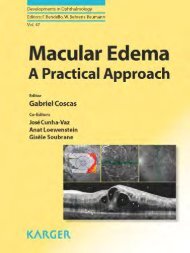Primary Retinal Detachment
Primary Retinal Detachment
Primary Retinal Detachment
Create successful ePaper yourself
Turn your PDF publications into a flip-book with our unique Google optimized e-Paper software.
Chapter 3<br />
Encircling Operation with Drainage<br />
for <strong>Primary</strong> <strong>Retinal</strong> <strong>Detachment</strong><br />
Hermann D. Schubert<br />
Encircling circumferential buckles and drainage, also known as<br />
“scleral buckling”, were introduced by Arruga and Schepens [1, 2]<br />
in the 1950s. Encircling traces its roots to circumferential dissection<br />
[3], barrier diathermy [4] and the buckle as practiced by<br />
Jess [5] and Custodis [6]. Drainage can be traced back to repeated<br />
scleral punctures to flatten retinal elevations (ponction sclerale)<br />
[7] and Jules Gonin’s ignipuncture technique [8]. This chapter will<br />
review the reasons why eyes were originally encircled, why the<br />
procedure works in a majority of cases, and why eyes are still being<br />
encircled and drained today, despite the procedure’s inherent<br />
morbidity.<br />
Origins of Encircling: Arruga and Schepens<br />
Arruga devised a simple procedure using a nylon, silk or supramid<br />
suture to encircle the equator of the eye (Fig. 3.1). Breaks were<br />
either diathermized according to Gonin’s principle or isolated by a<br />
barrier: “Je diathermise la region des dechirures, ou aux endroits<br />
qu’il faut isoler par un barrage” [1].<br />
Arruga’s operation consisted of a treatment of breaks, creation<br />
of barriers, and volume reduction. Fluid was drained from and air<br />
was injected into the eye to replace lost volume. Tying a suture at<br />
the equator (14 mm posterior to the limbus) both reduced the volume<br />
of the ocular cavity, relieving vitreous traction, and protected<br />
the posterior segment from the torn anterior segment, at the price





